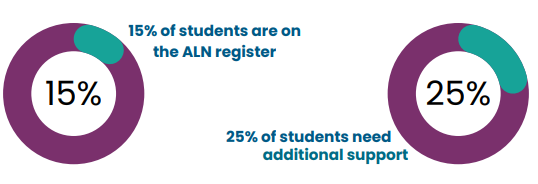



“Everybody should be working in this way, working collaboratively. We work closely as a cluster and beyond as well. It is really important. Some were reluctant initially but we were excited from the start, not criticising but being constructive with different things. As the years, months, weeks went by we built on it. It would just be part of our meeting on a Friday morning. It is definitely the way everyone should work. So valuable, really, really important.”Headteacher at Ysgol yr Hendre
The school has just over 400 pupils, and was moved to a new building in March 2012 with 15 classes and 2 form entry. It runs after school clubs, and children can be there from 8-6am. The school serves a broad range of families, with a variety of working and non-working parents. Welsh is the main language, with children coming from homes where at least one adult speaks Welsh. More recently, the school offers English as an additional language, there have been more overseas students joining. A total of 15% of students are on the ALN register, but additional support to 25% including social and mental health.

Schools received the initial SPP training in 2022, with 2023 the first year peer reviews took place. Over the previous two years the school has developed a framework to complement the SPP programme, developing internal processes to support collaboration as a cluster.
The school found that after COVID-19, there was a lot of backward movement, and many existing school processes were found to be ineffective, even when they appeared to be good on paper. SPP resources were reviewed and considered to be valuable to achieving goals and formulating new plans in tackling the difficulties since COVID-19. Assessment for learning was the first area that was identified as requiring development, with inconsistencies throughout the school.
Using the SPP framework, enquiry questions where developed alongside a plan of what to evaluate, and the type of evidence that would be needed to demonstrate change. Criteria was developed for what was expected within learner exercise books, asking teachers to self-assess on what they did well and what they needed to improve on. The school leadership then conducted learning walks, talking to
teachers and pupils, validating what teachers had reflected on. Within 6 weeks, improvements were made, with more consistency across the school by the end of term.
The evaluation report provided evidence of improvement again the evaluation questions identified as part of the review. Teachers reportedly felt they were celebrating how well everyone had done, and felt part of the process opposed to receiving criticism. Teachers were provided with examples from other classrooms. Once this self-review was completed, this same model was used across the cluster.
The first official self-review area selected was improvements in mathematics as identified as an area for improvement for the school. Some other schools tend to select areas they were stronger in for the first review.
However, the headteacher noted:
“We went after maths which was one of our priorities for improvement but others went after things that were their strengths as a way of validating rather than improving and supporting improvement with each other.
But what we found as we went through the year, other schools realised that it was more beneficial to go after an area that needed improvement. People wanted a different perspective, saw an improvement as it evolved. Next year we’ve already set date around cluster collaboration in math and language and people will find more of a benefit from it.”
One area for improvement related to the improvement facilitator having a greater role in evaluation work. They felt they did not have enough information about other schools before starting the peer review, and without greater levels of participation the workshops were challenging. Due to this lack of awareness of what is happening in other schools, during workshops facilitators reportedly referred back to practice in their own schools, rather than adopting a broader outlook.